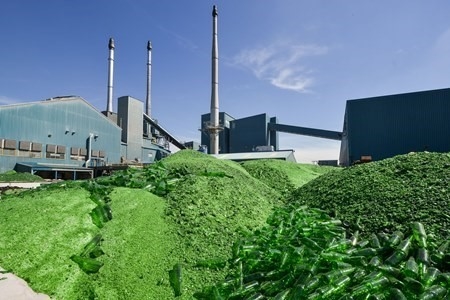 e glass manufacturing plants in Yorkshire (at Knottingley, Doncaster and Barnsley), supplying the world’s leading food and drinks companies, is partnering Reuse to increase the volume of cullet. Reuse ( a division of the privately owned Australian recycling and waste management company, URM (United Resource Management), who also has three plants in Yorkshire, is one of the UK’s leading glass recycling companies.
e glass manufacturing plants in Yorkshire (at Knottingley, Doncaster and Barnsley), supplying the world’s leading food and drinks companies, is partnering Reuse to increase the volume of cullet. Reuse ( a division of the privately owned Australian recycling and waste management company, URM (United Resource Management), who also has three plants in Yorkshire, is one of the UK’s leading glass recycling companies.The partnership’s first action is a £5 million investment in state of the art sorting and separation technology. The new technology comprises a four stage process, starting with the removal of medium sized organic and loose ferrous metals, followed by a drying section to remove dust and smaller materials, and thirdly, the removal of residual metallic, leaded glass and materials that burn at much higher temperatures than container glass such as pyrex.
The final and most critical stage subjects the remaining material to a thorough cleaning before it is separated by colour using a range of advanced cleaning, purification and optical sorting techniques. This new technology, enables much better material recovery of glass by colour from the waste stream , for example glass particles as small as 4mm can now be successfully separated by colour, as opposed to only 10mm with the previous technology.
The resulting “pure” cullet is then supplied to Ardagh as the highest quality recycled glass for use in its furnaces to make new bottles and jars. This significant breakthrough has already helped Ardagh to increase the recycled content of the glass bottles and jars that it produces by 12 per cent.
Sharon Crayton, Head of Marketing at Ardagh Glass, Europe, explains “We have been producing green bottles that contain over 90 per cent of recycled glass for many years, but high recycling levels for clear (flint) glass have previously posed a challenge due to difficulties in colour separating clear glass back to a pure enough colour at the required quality specification . This new technology has put us at the forefront of UK recycling, helping us to significantly increase the recycled content for clear (flint) bottles and jars. For example, our Doncaster plant which is focused solely on the production of clear (flint ) glass , achieved an average recycled content level of over 50% in the first quarter of 2014 against an average recycling rate of 32% in the same quarter of 2013.
The new Reuse glass sorting and separation facilities have a total capacity for up to 250,000 tonnes of waste glass – approximately 13 per cent of the UK’s steam of waste glass. Most of the glass supplied to these units is collected in the North of England, maximising the local nature of glass recycling and minimising the carbon footprint of modern glass packaging.
Sharon Crayton adds: “Glass packaging is already a very successful environmental story as bottles can be recycled over and over again, without limit and without losing any of its quality as the most natural and healthy packaging medium. The partnership we are announcing enables us to make even more use of the glass that is recycled in homes and businesses throughout Yorkshire and the North of England, helping us to provide our customers with products that meet the very highest recycling levels.
Mark Wilson from Reuse says: “With recent changes over the past few years in the way waste glass is collected, moving away from bottle banks to commingled household (kerbside) collections, the main challenge we faced was to find better ways of separating the glass from other recyclables, and then re-processing it into quality colour separated cullet. This latest investment, the first in an ongoing programme, gives us the technology to produce more finished cullet of the highest standard to meet the growing requirements of Ardagh.”
Wilson added; “However, it remains easier and more effective to recycle glass back into glass bottles and jars when glass is collected separately from other packaging materials. We therefore urge councils to consider this when renewing their waste management contracts and to specify that recycled glass goes back into making new glass packaging rather than less sustainable uses such as aggregates. We are happy to share our knowledge and experience to support the process and help increasing glass recycling rates even further.”





